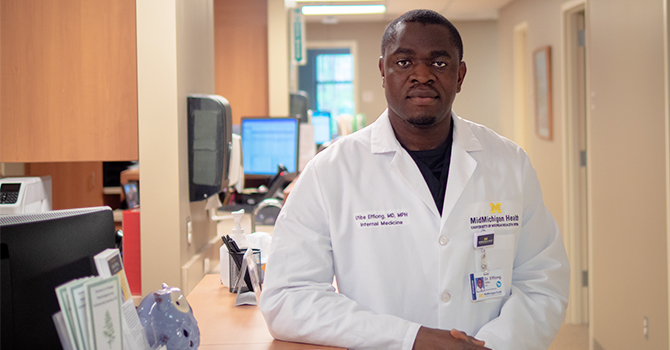A Desire to Be More: How Public Health Connects Medicine to Patient Communities

Utibe Effiong, MPH ’14
Physician, MidMichigan Health Center, Mount Pleasant
By the time I was 10 years-old, I was certain I wanted to become a physician because I wanted to positively impact lives. But I knew medicine would probably be the most challenging career I could pursue.
When I was in grade school in my hometown of Lagos, Nigeria, I became a class representative.The idea that I could speak for people who couldn't speak for themselves, or were too shy or too afraid to, was very inspiring for me.
Between my desire to help others and the inspiration that came from speaking out for others, I had discovered at a young age the two pillars that would shape my life and career.
As a physician, I could see not only that my work helped individuals with their health but that I could improve society and even protect our planet.
I did enter medical school and, just after classes began, fell ill with meningitis. I was unconscious for two weeks. The experience solidified my interest in the prevention of illness through early diagnoses, efficient and accessible treatments, and public health policy.
After medical school, I worked as a physician and trained medical students and residents in Nigeria. As a physician, I could see not only that my work helped individuals with their health but that I could improve society and even protect our planet.
Public health is really the only way to approach health, because we are all connected in ways too numerous to count.
Health is more than just illnesses. Your health is everything around you, including our environment and our climate. I was first drawn to public health by a desire to be more, a desire to do more than seeing one patient at a time, even if it was just changing how I was practicing medicine. Public health is really the only way to approach health, because we are all connected in ways too numerous to count.
In primary care, you can actually have a huge impact with these insights in mind. For example, you can connect patients to resources for better self-care. Patients who understand their prognosis more fully and understand how to access and how to use the resources at their disposal will have better outcomes.
More about Utibe
Effiong serves as a physician at the MidMichigan Health Medical Center in Mount Pleasant, Michigan, where he specializes in adult internal medicine, including hypertension, diabetes, and cancer prevention and care.He is a Senior Fellow for Global Health and International Development at the Aspen Institute and a clinical assistant professor of medicine at Central Michigan University and Michigan State University.
Another example is that we finally have insurance codes that say "not able to afford medication," so this is now a diagnosis. Is it not part of your health if you cannot afford the medications you need to be healthy? Too rarely are the social determinants of health taken up as part of a diagnosis itself, but these are things we need to deal with. Loneliness, mental health, lack of insurance, and so on—they all impact health. A diagnosis won’t help a patient as much as it should without considering all of the factors that impact their health. We have the field of public health to thank for this transition.
We have to do something about climate change on the policy level to support people who won't have control over factors that impact their health.
Finally, climate change deserves our attention even sometimes in the examination room. I don't usually discuss climate change with patients, but sometimes I do—for example, a patient with asthma. In that case, we might talk about air quality, heatwaves, their home environment like air conditioning, pollen counts, and what to keep an eye on as climate changes. What exposures do they monitor now that could become more intense for them? Not every patient can control some of these factors, so in addition to their own self-care and conversations with physicians, we have to do something about climate change on the policy level to support people who won't have control over factors that impact their health.
The best thing to happen to me in my career was having the opportunity to study public health principles and to gain an appreciation of the value of public policy in human health.
At the time of the 2013 Ebola outbreak, I was in South Africa. I wrote a piece called “Not Just an African Problem," in which I talked about the epidemiology of infectious disease and the interconnectedness of human communities beyond national borders. Thankfully, these outbreaks have been well contained in recent years. Unfortunately, we still do not have a fully tested Ebola vaccine.
To make a true impact on the public’s health, we have to do things on a big scale.
We have seen a lot of progress, but after 50 years of knowing about a disease, we are still working on a vaccine. Does a disease have to threaten Western nations for us to get a vaccine? In today’s world, are there any infectious diseases we can truly say will not impact all of us?
To make a true impact on the public’s health, we have to do things on a big scale. Providers can share big ideas and help people in big ways in the exam room. Public policy can take on big health problems, as can public health researchers and educators. We have to be more if we are going to take care of everyone and everything around us.
- Interested in public health? Learn more here.
- Read more stories about Environmental Health Sciences students, alumni, faculty, and staff.
- Support research and engaged learning at the School of Public Health.
